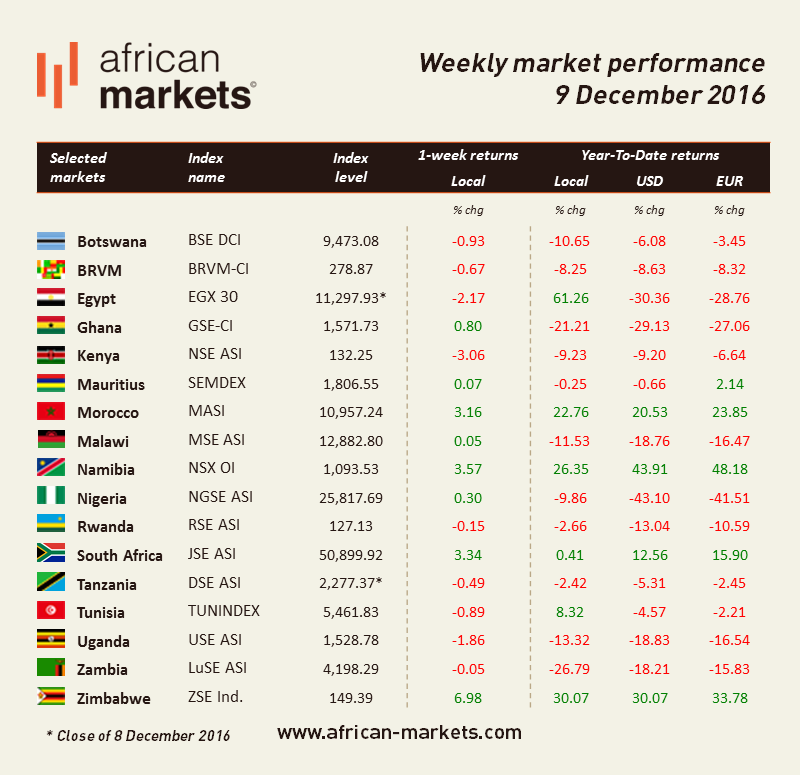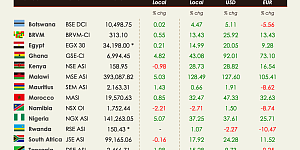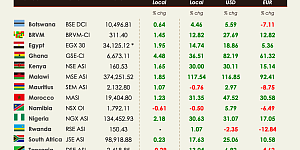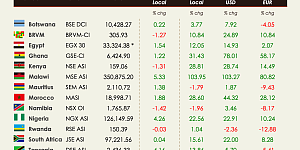The end of the year comes with its share of surprises and disappointments. Let’s first focus on the surprises.
Investors are overwhelmed by the Zimbabwean bond notes as a new way of exchanges as per the performance of the index this week. The index performance suffered from a flee from investors on the back of lack of cash and liquidity, weak aggregate demand and reduced business confidence. Lack of positive fundamentals throughout the year as well as sluggish economic growth did not help either. The Reserve Bank of Zimbabwe will release a second tranche worth $7mn this week bringing the total amount disbursed to $17mn.The ZSE Ind. gained 6.98% this week and is our best performer.
The NSX OI gained 3.57%. Namibian central bank kept its rate unchanged this week at 7% stating that level was supportive of economic growth. Moody’s affirmed the country’s BBB- credit rating in the beginning of this month but revised its outlook from stable to negative emphasizing the need of policy reforms to address economic weaknesses. The latter find their sources in rapidly rising public debt, extensive current account deficits and quite low international reserves. Besides, Namibia strongly relies on volatile Southern African Customs Union (SACU) receipts for foreign exchange earnings and government budget revenues. Namibia’s economy decreased by 1.2% in 2Q16 while it increased by 3.4% in 1Q16. Very low growth in large trading partners such as South-Africa has been affecting the country.
The South-African Statistics office released its report on Tuesday showing the GDP grew by 0.2% year-on-year for the third quarter. The country needs growth to avoid a rating cut next year. Nevertheless, the JSE ASI gained 3.34%.
In Ghana, the opposition leader Akufo-Addo has won the presidential election. Former President Mahama has recognised his defeat. President-elect Akufo is a leader from the New Patriotic Party promised to create new jobs and stimulate growth. Akufo politic life involves a foreign minister service from 2003 to 2007 during the eight-year reign of the NPP. The GSE-ACI gained 0.80%.
The NGSE ASI gained 0.30%. In an interview, Amina Mohammad, Nigerian environment Minister stated that Nigeria was getting ready to raise 20bn naira by first quarter 2017 to fund renewable energy projects. On top of that, Nigeria is trying to diversify its economy away from oil. A good call for a country which suffered from a deflation as oil prices tumbled and output slowed which jeopardised its national budget. It is reported that Nigeria is planning to a $3.2bn capitalisation lender for agricultural businesses. The Bank of Agriculture, whose purpose is to provide financing to agricultural projects, will lend at an interest rate of less than 10%.
The EGX30 lost 2.17%, the benchmark suffered its first decline in 6 weeks. Egypt’s core inflation increased by 5.33% month-on-month in November to reach 20.73%. In the meantime, President El-Sisi pretty much declared that current Egyptian pound valuation did not reflect the currency’s fair exchange rate versus the USD. He added that current FX rate would not last for long. This came as earlier on that day, the central bank governor maintained that the government would not intervene in the FX market anymore.










































